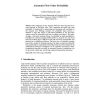409 search results - page 30 / 82 » Semantics for a theory of defeasible reasoning |
POPL
2006
ACM
14 years 8 months ago
2006
ACM
Functional programmers often reason about programs as if they were written in a total language, expecting the results to carry over to non-total (partial) languages. We justify su...
SEMWEB
2009
Springer
14 years 2 months ago
2009
Springer
Most languages for the Semantic Web have their logical basis in some fragment of first-order logic. Thus, integrating first-order logic with probability is fundamental for represen...
ISBI
2008
IEEE
14 years 2 months ago
2008
IEEE
In this paper, we present a Case Based Reasoning (CBR) system for the retrieval of medical cases made up of a series of images with semantic information (such as the patient age, ...
FASE
2010
Springer
14 years 2 months ago
2010
Springer
Abstract. Abstraction is essential in the formal specification of programs. A common way of writing abstract specifications is to specify implementations in terms of basic mathem...
TLDI
2009
ACM
14 years 4 months ago
2009
ACM
We present a possible world semantics for a call-by-value higherorder programming language with impredicative polymorphism, general references, and recursive types. The model is o...

